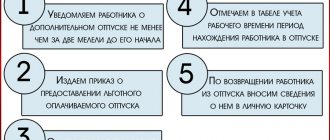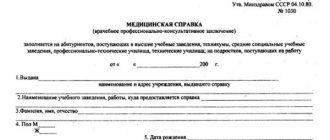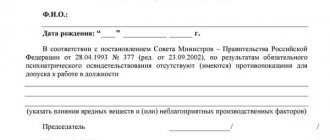Good day!
In this article, as in the previous one (link below), I want to talk about the rights of an employee, which allow, with minimal effort, to save money during employment, work and dismissal.
In my last publication, we talked about the fact that a dismissed employee, regardless of the grounds for dismissal, received an injury, mutilation or simple illness within 30 days after dismissal and opened a sick leave certificate, has the right to have it paid by the previous employer, read more here.
This article will focus on a citizen’s monetary expenses related to employment, which the employer is obliged to reimburse even in the event of a refusal to hire.
Namely, the law establishes the obligation of the employer to send personnel for a medical examination upon employment and periodically during the period of work. Despite this, few people know who is obliged to pay for a medical examination,
However, this issue has repeatedly been the subject of consideration by courts of general jurisdiction, which have given unequivocal explanations in this regard.
Who is required to undergo a medical examination?
Current legislative acts require persons belonging to certain categories, as well as those applying for vacancies from the following groups, without delay
- citizens who have not reached the age of majority;
- health center staff;
- persons working in medicine;
- beauty industry personnel (cosmetologists, hairdressers, nail technicians);
- laundry employees;
- personnel of educational and preschool organizations;
- workers in food production and catering establishments;
- persons performing work duties in conditions of special risk or engaged in hazardous work;
- citizens working on a rotational basis;
- judges;
- athletes;
- employees of customs services, police, departmental and private security.
A complete list of areas of labor activity, specialties and positions subject to immediate primary and planned preventive examinations is presented in the order of the Ministry of Health and Social Development of the Russian Federation dated April 12, 2011 No. 302n. In some circumstances, the supervisor may, at his own discretion, refer the applicant for an initial medical examination.
The employer has the right to refuse to hire a candidate in cases where he categorically does not want to undergo a mandatory primary medical examination or the medical examination has been passed, but the applicant for a vacancy has been diagnosed with a disease that is legally incompatible with the implementation of this type of work activity.
It will be useful for anyone who is about to undergo a medical examination when applying for a job to know where and which doctors they need to visit, as well as how long the certificate is valid.
Peculiarities of payment for medical examinations of certain categories of workers
According to the law, the employer bears increased obligations and expenses for medical examinations in relation to, in particular, the following categories of persons:
- minors: mandatory preliminary medical examination (Article 76 of the Labor Code of the Russian Federation), annual examination at the expense of the company (Article 266 of the Labor Code of the Russian Federation);
- workers in underground work: mandatory examination before hiring, medical examinations at the beginning and end of the working day or shift (Article 330.3 of the Labor Code of the Russian Federation);
- athletes: examinations during employment, mandatory periodic examinations, extraordinary examinations at the request of athletes and in the presence of medical recommendations (Article 348.3 of the Labor Code of the Russian Federation).
Read about pre-trip medical examinations of drivers in our article at the link: Conducting pre-trip medical examinations of drivers.
So, medical examinations of employees, in connection with employment or periodic, are paid for by the employer.
Who pays?
The question: should an employer pay for a medical examination when hiring can be answered based on some articles of the Labor Code of the Russian Federation.
Art. 212 and 213 of the Labor Code of the Russian Federation provide for the employer’s obligation to organize, at his own expense and the organization’s funds, the following:
- applicants for vacancies of urgent primary medical commissions;
- employees of the enterprise, during the period of their work, undergo routine medical examinations;
- employees of the enterprise, with the same condition, unplanned diagnostic examinations on their initiative, with the preservation of their workplace and average salary for the period of the examination.
The listed provisions can and must be observed only on the condition that the field of work, specialty, position of applicants/employees are on the list established by Order No. 302n.
The pre-employment medical examination may be paid for by the employer in one of the following ways:
- The organization enters into an agreement with a specific medical institution and pays for the examination of candidates and employees sent there by bank transfer . The enterprise must have a calendar schedule for medical examinations approved by the healthcare institution;
- The applicant undergoes a medical examination at his own expense , and the employer, along with the first salary, returns the money spent to him.
The second method is fraught with pitfalls:
In the best case, payment for a medical examination by the employer upon hiring can be made three to four months, or even six months after the conclusion of the employment contract, motivating its actions by the fact that after the first salary the employee can run away to another company, and the organization’s budget funds will be wasted in vain.
Some companies, in their desire to be on the safe side, go even further, writing in the organization’s internal labor regulations a clause stating that the applicant undergoes the initial medical examination at his own expense , and subsequent ones, subject to employment, at the expense of the employer.
The most unpleasant option also happens - when the medical examination is passed, but the applicant’s health condition does not allow the applicant to work in this organization/enterprise, and no one is going .
In all respects, the employer's behavior is unlawful towards the employee .
According to labor legislation, an officially hired employee must receive compensation for a medical examination, even if he has worked for the shortest possible time (up to one day).
Also, the Labor Code of the Russian Federation does not stipulate in any way cases when all expenses for passing a medical commission remain with the employee due to the fact that an employment contract was not subsequently drawn up with the employer.
Thus, if the applicant has undergone an initial medical examination, the employer must compensate the costs for any result .
Who pays for extraordinary medical examinations?
Art. 212 of the Labor Code of the Russian Federation indicates that payment for medical examinations by the employer is made not only in relation to preliminary and periodic examinations, but also to other types of medical examinations required by law.
Thus, the employer is obliged to pay for extraordinary examinations and mandatory psychiatric examinations.
Other issues related to medical examinations of citizens and medical contraindications for performing work are discussed here: Dismissal for medical reasons - a step-by-step procedure.
Medical examination at the request of the employer
If the field of work, specialty or position for which the applicant is applying is not included in the list established by Order of the Ministry of Health and Social Development No. 302n, undergoing a primary medical examination only at the initiative of the employer :
- carried out by the applicant solely on a voluntary basis;
- paid by the employer.
The manager does not have the right, in one form or another, to force a candidate for a position to undergo an optional primary medical examination without compensation.
Organization of preliminary medical examination
Each organization must approve a list of positions, upon admission to which employees must undergo a medical examination by certain doctors. This list is approved by local regulations (for example, by order of the manager).
To conduct medical examinations, the organization enters into an agreement with a medical institution. On the basis of this agreement, medical examinations during employment will be carried out and paid for. The medical institution with which the contract is concluded must be licensed and have the necessary doctors on its staff.
Before concluding an employment contract with an applicant, he is given a direction to undergo an examination against signature. It must contain information about the employee and employer, the medical organization and the type of medical examination.
After passing the examination, the applicant will be issued a conclusion on his suitability or prohibition from performing certain duties and functions. He must bring this conclusion to the employer. And only after that an employment contract is concluded, and the employee can begin to perform his labor functions.
Payment and recording in accounting
In accordance with Article 149 of the Tax Code of the Russian Federation, the cost of immediate primary and routine medical examinations for employees is not subject to VAT and social contributions, only insurance contributions, are not deducted from this amount.
Expenses incurred by an enterprise to pay for medical examinations of applicants and employees engaged in its main activities are taken into account in accounting as gross expenses for ordinary activities.
Direct compensation to employees for funds spent on undergoing an independent medical examination is carried out as settlements with personnel for other operations.
Payment for the services of a medical institution with which a service agreement has been concluded - as settlements with contractors and suppliers .
Who should unconditionally undergo examination in a medical facility?
According to Art. 213 of the Labor Code of the Russian Federation, employees employed in:
- at work with dangerous or harmful professional conditions (including underground);
- in the transport sector;
- at hard work;
- in industry, trade, medical institutions, children's institutions, etc.
In the first three cases, the main task of medical examinations is to ensure the health of the worker himself: it is necessary to determine his ability or inability to perform non-standard work. Employees of catering organizations, the food industry, the trade sector, water supply facilities, medical and preventive institutions, and some other areas must undergo medical examinations, primarily in order to preserve the health of the population, prevent the spread and occurrence of various diseases. Naturally, such a division is conditional.
According to Article 69 of the Labor Code of the Russian Federation, citizens of the Russian Federation who have not reached the age of fourteen must also undergo a mandatory primary medical examination upon employment, and the employer has the right to require them to undergo an examination at a medical institution annually.
Refusal to reimburse expenses
Due to a lack of money in the organization’s budget or other circumstances, employers sometimes refuse to reimburse employees for expenses incurred during the initial medical examination.
In this situation, the employee, at whose expense the medical examination was carried out, has the right , having provided all supporting documentation, to file a claim in court to recover from the employer the amount spent on the medical examination.
To summarize, we can say that primary and routine medical examinations are necessary for both the manager and the employees of the enterprise, regardless of who pays for the medical examination when applying for a job. Regular medical examinations ensure the health of workers and allow developing diseases to be identified at an early stage, which justifies the cost of these measures.
Payment for medical examinations of employees of organizations
Unfortunately, not all employers are concerned about the health of their staff, and, incidentally, the employees themselves are not particularly concerned about this issue. Although both should be interested: being healthy is undoubtedly better for the employee, but for the employer, extra sick leave is economically unprofitable and can legally lead to various unpleasant consequences. In general, it is certainly necessary to know your responsibilities and rights in this aspect of labor relations, and therefore we will consider the question of who pays for the medical examination upon hiring, as well as all subsequent examinations of employees in medical institutions.
Validity period of the medical certificate
Like any document, a certificate has its own validity period, during which it can be used to get a job. Depending on the form of this document, which varies among different professions, there are different expiration dates. Yes, for:
- for ordinary professions, a certificate 086/u is issued, its validity is six months;
- civil servants have another option 001-ГС/у, which is valid for a year.
The validity period is calculated from the moment the certificate is issued. The date is indicated at the bottom of the document, next to the signature and seal. After expiration, a medical examination will have to be completed again if the person continues to look for work.
Rights and responsibilities of the candidate
Medical examinations upon entry to work are required for both employees and the administration of the enterprise.
If a candidate has received a referral for a medical examination, but has not submitted a conclusion within 1-3 weeks, the employment contract may be cancelled. In this case, the company notifies such applicant that another employee has been hired in his place. The timing of the medical examination must be controlled by the responsible person. The medical organization is responsible for false examination indicators.
In food production and organizations, workers must undergo periodic preventive medical examinations twice a year, and persons under 21 years of age - annually. If an employee refuses a periodic examination, the employer may remove him from work. The employer may also impose disciplinary sanctions.
The employee has the right to reimbursement for the cost of the medical examination if he presents a receipt, or the company can pay the costs to the medical facility itself.
If the cost of the medical examination is refused, the employee can file a complaint with the labor protection inspectorate. If contraindications are identified for the position in which the employee works, the employer can offer him a more suitable job.
Sequence of medical examination:
- The employer gives a referral to a medical institution, in which he enters the employee’s data, position, working conditions, address and company name.
- The candidate presents the referral and his passport to a medical organization that has the appropriate license, where he will be examined.
- The applicant needs to undergo a medical examination by the right doctors.
- The results of the examinations are entered into the personal medical record.
- After visiting all the specialists and passing the necessary tests, a conclusion is written about the possibility of working in the proposed position.
- The candidate presents a medical report to the employer.
The conclusion on professional suitability is written in two copies: one is immediately issued personally to the employee who undergoes a medical examination, and the second remains along with the patient’s medical record. When there is a suspicion that an employee has an occupational disease, a medical organization issues a referral to an occupational pathology center or another specialized organization that will conduct an examination and establish a presumptive diagnosis of the disease.
If periodic inspection of a group of employees is necessary, use a list of employees by name. It is written in two copies: one is sent to a medical institution, and the second remains at the enterprise with the person responsible for organizing the medical examination. The medical record is kept at the enterprise, and in cases where this is not possible, it is given to the employee. The Sanitary and Epidemiological Service can check its availability at any time.
When undergoing a medical examination, you need to be examined by the following doctors:
- ophthalmologist}
- otolaryngologist}
- surgeon}
- neurologist}
- therapist.
You also need to do a blood test, urine test and undergo a fluorographic examination of the chest. As prescribed by the therapist, examinations by a narcologist and psychotherapist may be necessary.
Payment Methods
Who should pay for medical examinations for employees? And how is payment made? There are several options available:
- The company has a legally certified agreement with a certain medical institution. As a rule, payment in such cases is made by bank transfer directly by the organization. The enterprise prepares a calendar schedule and lists of employees to undergo a medical examination.
- A potential employee can independently pay for his own examination, and the management undertakes to compensate for the cost spent along with the first salary.
However, this is not a completely safe option for the applicant. As a rule, employers pay employees no earlier than several months after employment. Sometimes management convinces their employees that they must pay for the first examination themselves, but subsequently the annual medical examination of the employees will be financed by the company. And often, if the applicant is not suitable for medical reasons, and the employment contract has not been concluded, the management of the enterprises even turns out to compensate for something. It is important to know exactly what rights you have. All of the listed actions of directors are illegal. Even if an employment contract was not concluded, or the employee worked for an extremely short period of time, the cost of the medical examination must in any case be compensated.
What to do if your job application is refused
There are situations when a person paid for a medical examination out of his own pocket, but doctors declared him unsuitable for employment in this specialty. At first glance, the employer should not reimburse expenses: the applicant is not an employee of the company. This is a common misconception.
The law does not indicate that in case of refusal to hire an employer, the employer is exempt from paying monetary compensation for passing a medical examination. Therefore, if the doctors find the applicant unsuitable, an application for reimbursement of expenses is also written and the package of documents discussed above is provided.
If the manager refuses to compensate financial costs, the applicant can contact the labor inspectorate or the courts. Legal practice shows that in such situations the law is on the side of the plaintiff. In such cases, after a positive decision is made, the funds are forcibly recovered from the employer.
Employer Responsibilities
The Labor Code states that the employer is obliged to pay the costs incurred by the employee to undergo a medical examination, regardless of whether an employment contract is concluded between the parties or not. This means that even if the employee worked only one day or, due to circumstances, did not start work at all, the employer is obliged to return the funds.
In turn, the employer has the right to refuse employment to an employee if he refuses to undergo a medical examination or if the medical examination is passed, but the employee has a disease that prohibits work specifically at this enterprise .
These terms of payment and medical examination apply only to organizations included in the category of order 302n.
But there are also other organizations that do not fit into these categories, for example, bank employees. In these organizations, undergoing a medical examination is optional and is carried out on a voluntary basis by the employees themselves. However, banks conclude agreements on compulsory health insurance and provide each employee with such a policy. This policy gives the employee the right to undergo a medical examination or any medical procedures in certain medical institutions either free of charge or at a discount, depending on the terms of the contract.
The procedure for undergoing a preliminary medical examination established by law
The employer’s obligation to organize a preliminary medical examination for applicants is enshrined in Art. 212 Labor Code of the Russian Federation. The procedure for its implementation is regulated by the above-mentioned Order of the Ministry of Health and Social Development of the Russian Federation No. 302n. According to Part II of the applicable Procedure, the procedure is as simple as possible and does not require any expenses from the applicant.
| Procedure for undergoing a medical examination upon employment | ||
| What does it include | What does it mean (description) | What to pay attention to |
| Issuing a referral for a medical examination to an applicant | This direction is filled out and signed by the authorized person of the employer. The form indicates: details of the employer and medical organization; Full name, personal data of the applicant; harmful (hazardous) factors, types of work on the basis of which the applicant will be examined | The referral is issued to the applicant with a personal signature |
| Submission of documents during medical examination | The applicant must present at least his civil passport and a letter of reference issued by the employer | A health passport is attached if available. In some cases, the decision of the medical commission on the completed psychiatric examination is presented |
| Preparation of documents for the person being examined at the medical center. organization that conducts medical examinations | The person being examined is assigned: honey. card in form No. 025/u-04; health passport (if you don’t have one), which, among other things, indicates doctors’ conclusions on a medical examination | Honey. the card remains stored in the medical office. organization, and a health passport is issued to the examined person after a medical examination |
| Conducting a medical examination | The procedure involves performing the necessary laboratory and functional studies. Upon completion of the examination, a medical certificate is issued. a conclusion that contains: date of issue; information about the person examined and his employer; harmful factors (types of work); medical examination results (contraindications to work, etc.) | The conclusion is certified by the signature of the chairman of the medical department. commission and medical seal. organizations. One copy of the conclusion is given to the examined applicant. One copy of honey. the conclusion remains in the medical organization and is filed with the outpatient card of the examined person. |
List of honey contraindications, in the presence of which the examined person should not be allowed to work, are determined by Part IV of the Procedure, approved. Order No. 302n. These include, for example: ischemic heart disease, active forms of tuberculosis, chronic skin diseases, glaucoma, substance abuse, mental illnesses with persistent, worsening manifestations, and other diseases.
How to reimburse expenses
As a rule, the administration of a company with a vacant position requires applicants for a vacancy to provide a package of documents. In addition to documents confirming the level of education, the company's management may require medical certificates. A medical record falls into this category. The presence of this document can significantly reduce the costs associated with employing a new employee.
As we noted above, the company’s management can enter into an agreement with a specific medical center that will provide medical examinations of workers. The company may also ask the candidate to pay for all services himself, promising him to cover all expenses incurred at the time of payment of wages.
Required documents
In the case where the employee independently pays all the costs associated with undergoing the initial medical examination, the company acting as the future employer is obliged to fully compensate for all costs associated with preventive measures. Before going to the medical center, the employee must receive from the company administration a list of specialists who must be examined as part of the medical examination. The costs of visiting the doctors indicated in this list are paid by the employer.
In order to receive compensation, the employee needs to fill out an appropriate application, which will be submitted to the accounting department. This application must be accompanied by a referral to the medical center, a receipt confirming payment for services and a certificate issued by medical specialists. In the text of the application, it is necessary to indicate the total amount spent with reference to the receipt.
Transfer of documents to the accounting department and their recording
All of the above documents must be submitted to the accounting department. The accepted application must be signed by the head of the company. To do this, o is written on the received form. This document, certified by the signature of management, is used as the basis for issuing funds.
Payment of compensation is carried out together with the issuance of the first salary. According to the established procedure, the maximum duration of the period allotted for the issuance of funds is ten days from the date of receipt of the application.
And according to Article 212 of the Labor Code of the Russian Federation, the employer does not have the right to allow an employee to work who has not passed a medical examination











